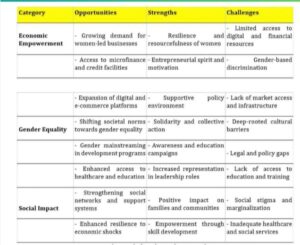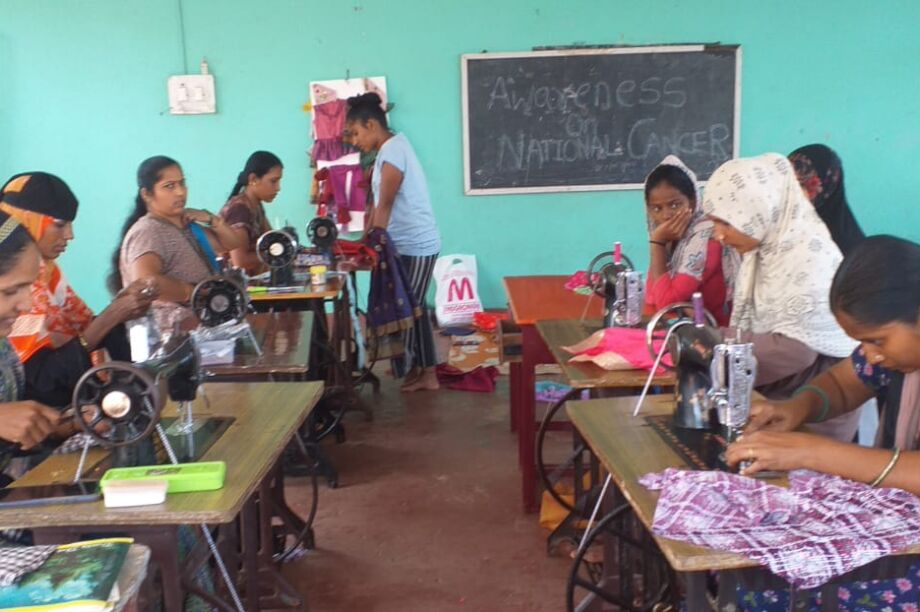Research Objectives
To Examine the profound impact of economic empowerment initiatives on disadvantaged women and their subsequent positive effects on global well-being.
Keywords
Women owned small businesses, Skill development, Digital & Financial literacy, Gender equality, Inclusive economic empowerment.
Bio
Geeta Bora is the Founder and Director of Spherule Foundation, a prominent NGO dedicated to social welfare initiatives across India. With a background in Computer Science, she spent 14 years as a Software Architect in both India and the USA, leveraging technology to enhance accessibility and affordability in education. Geeta is renowned for her advocacy in menstrual health and hygiene, demonstrated through her authored book “Moon Time,” which has garnered widespread recognition domestically and internationally. Beyond her NGO leadership, she serves as an External NGO Consultant for various corporate entities and multinational corporations, furthering her commitment to driving positive change on a broader scale.
Abstract
This paper examines the profound impact of economic empowerment initiatives on disadvantaged women and their subsequent positive effects on global well-being. It focuses on various strategies such as small business establishment, micro- entrepreneurship, skill development, and digital and financial literacy, along with social security provisions, to uplift marginalized women economically. Through a thorough review of literature, case studies, and empirical data, it elucidates the manifold benefits of fostering entrepreneurial activities among underprivileged women.
The study highlights the pivotal role of small businesses in promoting economic self-sufficiency, community development, and poverty alleviation. It explores how skill acquisition programs enhance employability, potentially breaking the cycle of poverty across generations. Moreover, it delves into the transformative influence of digital and financial literacy on women’s autonomy and decision-making abilities, thereby boosting their engagement in economic pursuits.
Additionally, the research investigates the broader societal implications of women’s empowerment, including reduced gender disparities, improved educational opportunities for future generations, and overall enhancement of quality of life. It proposes a comprehensive framework for policymakers, NGOs, and businesses to implement sustainable and inclusive economic empowerment programs tailored to the specific needs of underprivileged women. In conclusion, the paper advocates for prioritizing the economic empowerment of disadvantaged women as a crucial strategy for fostering a more equitable and prosperous global community. By facilitating small business establishment, providing essential skills, and enhancing digital and financial literacy, societies can unleash the untapped potential of these women, leading to a more harmonious and prosperous world.
Introduction
The genesis of this research paper stems from extensive engagement with millions of women across various states in India, spanning diverse socio-economic backgrounds and geographical landscapes. Through our work in the field of women’s empowerment, we have witnessed firsthand the resilience, aspirations, and untapped potential of underprivileged women striving for a better future for themselves and their families.
Over 6 years of dedicated effort at Spherule Foundation, our organization has collaborated closely with grassroots organizations, community leaders, and government agencies to implement empowerment programs aimed at enhancing women’s access to education, healthcare, livelihood opportunities, and social resources. Through capacity-building initiatives, skill development workshops, and advocacy campaigns, we have endeavored to create an enabling environment where women can assert their rights, amplify their voices, and pursue their aspirations with confidence and dignity.

Source: International Journal of Gender Studies in Development, Year 2020
In India, millions of women grapple with the burdens of poverty, limited access to education, healthcare, and employment opportunities, exacerbating gender disparities and hindering socio-economic progress. Among these women, those from underprivileged backgrounds face particularly acute challenges, trapped in a cycle of deprivation and marginalization. Addressing the plight of underprivileged women is not merely a matter of social justice but also a strategic imperative for fostering inclusive growth and sustainable development.
The plight of underprivileged women is deeply intertwined with broader socio- economic realities characterized by pervasive poverty, gender inequality, and limited access to resources. Economic empowerment holds immense significance as a means to address the multifaceted challenges facing underprivileged women. By enabling women to generate income, access financial resources, and acquire essential skills, economic empowerment initiatives offer a pathway out of poverty and dependence. Moreover, economic empowerment enhances women’s decision- making autonomy, strengthens their bargaining power within households and communities, and fosters greater gender equality.
Table 1: Summarizes opportunities, strengths, and challenges faced by
Research Objectives
Against this backdrop, this research paper aims to comprehensively examine the transformative impact of economic empowerment initiatives on underprivileged women in India . Specifically, the research seeks to:
Explore the multifaceted benefits of economic empowerment initiatives such as small business establishment, micro- entrepreneurship, skill development, digital and financial literacy and providing Social security Schemes.
Evaluate the effectiveness of existing economic empowerment programs in enhancing the socio- economic status of underprivileged women.
Identify key challenges and opportunities associated with implementing economic empowerment initiatives in Indian contexts.
Provide evidence-based policy recommendations for stakeholders, including governments, NGOs, and businesses, to design and implement sustainable and inclusive economic empowerment programs tailored to the unique needs of underprivileged women.
2 Literature Review
The literature review provides an extensive examination of theoretical frameworks and empirical studies pertaining to women’s economic empowerment in India . It elucidates various dimensions of economic empowerment, including small businesses, micro- entrepreneurship, skill development programs, and digital and financial literacy initiatives. Drawing upon a wide array of existing scholarship, this section synthesizes key insights, identifies gaps in the literature, and highlights the complexities of women’s economic empowerment within diverse socio- economic contexts.
Theoretical Frameworks:
Theoretical frameworks, such as the capability approach by Amartya Sen and Nussbaum, emphasize empowerment beyond resource access to meaningful choices. The gender and development (GAD) approach underscores addressing structural inequalities and patriarchal norms. Feminist economics highlights gendered economic processes, advocating for policies recognizing and redistributing unpaid care work.
Empirical Studies:
Empirical research on women’s economic empowerment reveals the effectiveness of interventions in enhancing opportunities. Small businesses and micro- entrepreneurship demonstrate entrepreneurship’s role in providing alternative income sources. Buvinic and Furst- Nichols (2014) highlight microfinance programs’ positive impact on income generation and asset accumulation. Skill development programs enhance employability and income potential, contributing to poverty reduction in countries like India, Bangladesh, and Kenya (World Bank, 2019; ILO, 2020). Digital and financial literacy initiatives promote economic inclusion by enhancing access to technologies and services (World Bank, 2018; ILO, 2020). Despite growing literature, gaps persist. Nuanced analyses considering intersectional dimensions, such as class, race, ethnicity, and disability, are needed. Longitudinal studies tracking the long- term impact of interventions are scarce, necessitating collaboration between researchers, policymakers, and practitioners to inform evidence-based policies effectively.
Methodology
This section outlines the systematic procedures to investigate the transformative impact of economic empowerment initiatives on underprivileged women in India, covering research design, data collection methods, analytical approaches, ethical considerations, and potential limitations.
Research Design:
This study adopts a mixed- methods approach, combining qualitative and quantitative methodologies for a comprehensive understanding of women’s economic empowerment.
Data Collection Methods:
- Literature Review: Commences with an extensive review of scholarly articles, reports, and policy documents.
- Case Studies: Involves qualitative data gathering through purposive case studies representing diverse contexts.
- Surveys and Secondary Data Analysis: Quantitative data collected through structured surveys and secondary sources for trend analysis.
Analytical Approach:
- Qualitative Analysis: Utilizes thematic analysis techniques for coded data from case studies.
- Quantitative Analysis: Involves statistical analysis using software for descriptive and inferential statistics.
Ethical Considerations:
Ensures participant rights, confidentiality, and privacy through informed consent and adherence to ethical guidelines.
Limitations:
Acknowledges potential biases such as sampling and response biases, as well as limitations in data availability from secondary sources.
Results and Discussion
3.1 Small Businesses and Micro-entrepreneurship: Driving Economic Empowerment
Small businesses and micro- entrepreneurship significantly empower underprivileged women in India, driving economic advancement.
Income Generation and Poverty Alleviation: These ventures provide women with alternative livelihoods, aiding poverty reduction by fulfilling basic needs and enabling investment in education and healthcare.
Economic Independence and Agency: Owning and managing businesses fosters autonomy, self-reliance, and confidence among women, amplifying their influence within households and communities.
Employment Creation and Community Development: These enterprises spur local economies, creating jobs and promoting innovation while enhancing infrastructure and social capital.:
Asset Accumulation and Wealth Creation
Through reinvestment and ownership of productive assets, women build resilience and contribute to long-term economic stability.
Challenges and Opportunities:
Limited access to resources and gender biases hinder growth, necessitating holistic interventions for sustainable success.
2.3.2 Skill Development Programs:
Fostering Economic Empowerment Skill development programs significantly contribute to economic empowerment among underprivileged women in India.
Enhancing Employability and Income Generation: Training equips women with skills for diverse employment opportunities, enhancing income and productivity.
Promoting Entrepreneurship and Enterprise Development: Entrepreneurial skills enable women to establish successful businesses, fostering economic independence and local development.
Fostering Innovation and Value Addition: Improved skills empower women to innovate, enhancing product quality and market competitiveness.
Empowering Decision-Making and Agency: Enhanced skills and confidence empower women to make informed choices, advocating for their economic rights and interests.
Challenges and Opportunities:2.3.3
Digital and Financial Literacy: Empowering Women for Economic Success Digital and financial literacy initiatives are integral to women’s economic empowerment in India.
Access to Financial Services: Improved literacy facilitates access to formal financial services, fostering economic resilience and participation.
Financial Management and Decision-making: Enhanced literacy enables informed financial decisions, optimizing resource allocation and investment.
Entrepreneurial Opportunities: Literacy empowers women to leverage digital Addressing barriers to access and participation is essential for ensuring the effectiveness and sustainability of skill development programs.
2.3.3 Digital and Financial Literacy:
Empowering Women for Economic Success
Digital and financial literacy initiatives are integral to women’s economic empowerment in India.
Access to Financial Services:
Improved literacy facilitates access to formal financial services, fostering economic resilience and participation.
Financial Management and Decision-making:
Enhanced literacy enables informed financial decisions, optimizing resource allocation and investment.
Entrepreneurial Opportunities:
Literacy empowers women to leverage digital platforms for business growth and market expansion.
Employment and Income Opportunities:
Digital skills enable women to access online job opportunities, increasing economic participation and flexibility.
Challenges and Opportunities:
Overcoming barriers to digital access and skills development is crucial for ensuring inclusive economic empowerment.
2.4 Policy Implications and Recommendations
2.4.1 Policy Implications and Recommendations
The impact of small businesses and micro- entrepreneurship on women’s economic empowerment necessitates targeted policy interventions and strategic investments to support entrepreneurship among underprivileged women in India.
Access to Finance:
Policy Implications: Governments and financial institutions should prioritize expanding access to affordable financial services for women entrepreneurs by reforming regulatory frameworks and incentivizing banks.
Recommendations: 1.Establish dedicated funds and loan guarantee schemes with preferential terms.
1. Integrate gender- responsive lending criteria into financial institutions’ processes.
Support alternative financing mechanisms 1. tailored to women entrepreneurs.
Market Access and Business Support:
Policy Implications: Interventions should enhance women entrepreneurs’ access to markets and business support services through strengthened linkages and partnerships.
Recommendations:
1.Establish entrepreneurship centers and business incubators offering training and mentoring.
2. Facilitate market access through procurement policies and trade promotion.
Skills Development and Capacity Building:
Policy Implications: Policymakers should invest in skills development programs tailored to women entrepreneurs’ needs.
Recommendations: 1.Integrate entrepreneurship education into school curricula.
2. Expand vocational training in high-demand sectors.
3. Foster collaboration between educational institutions and industry partners.
2.4.2 Legal and Regulatory Reforms:
Policy Implications: Governments should enact gender-sensitive legal reforms to remove barriers and protect women entrepreneurs’ rights.
Recommendations:
1.Streamline business registration procedures.
2. Enact legislation to protect women’s property and inheritance rights.
3. Strengthen enforcement mechanisms against gender-based discrimination.
2.4.3 Gender-Responsive Policies and Programs:
Policy Implications: Policymakers should mainstream gender considerations across all sectors and domains. Recommendations:
- Integrate gender impact assessments into policy formulation.
- Allocate sufficient resources for women’s economic empowerment initiatives.
- Strengthen institutional capacity for implementing gender-responsive policies.
2.5 Findings: Multifaceted Benefits of Economic Empowerment Initiatives:
Economic empowerment initiatives such as small business establishment, micro-entrepreneurship, skill development, and digital and financial literacy have yielded multifarious benefits for underprivileged women in India. Through these initiatives, women have gained financial independence, increased decision-making autonomy, and enhanced their socio- economic status. Small businesses have served as a catalyst for economic self- sufficiency, community development, and poverty alleviation. Micro- entrepreneurship has provided women with opportunities to utilize their skills and talents, leading to income generation and asset accumulation. Skill development programs have enhanced employability, thereby breaking the cycle of poverty across generations. Moreover, digital and financial literacy has empowered women to make informed financial decisions, access formal banking services, and participate more actively in economic activities.
Effectiveness of Existing Economic Empowerment Programs:
Existing economic empowerment programs have demonstrated varying degrees of effectiveness in enhancing the socio- economic status of underprivileged women. While some initiatives have succeeded in significantly improving women’s livelihoods and well-being, others have faced challenges related to implementation, sustainability, and scalability. Factors contributing to the success of these programs include tailored interventions addressing the specific needs of women, strong partnerships with local stakeholders, access to mentorship and support networks, and integration with broader development agendas. However, challenges such as limited access to resources, lack of infrastructure, cultural barriers, and patriarchal norms have hindered the impact of certain programs, highlighting the need for context-specific approaches and continuous monitoring and evaluation.
Key Challenges and Opportunities in Implementation: Implementing economic empowerment initiatives in Indian contexts entails addressing a range of challenges while capitalizing on existing opportunities. Challenges include inadequate access to finance and credit, insufficient infrastructure for skills development and entrepreneurship, social and cultural barriers limiting women’s mobility and participation, and systemic gender biases in policies and institutions. However, opportunities exist in leveraging technological advancements, fostering public-private partnerships, strengthening legal and regulatory frameworks, and promoting gender-sensitive programming. Moreover, the growing recognition of women’s economic empowerment as a driver of sustainable development presents an opportune moment for stakeholders to mobilize resources, build alliances, and advocate for policy reforms aimed at promoting gender equality and inclusive growth.
Discussion
The findings of this research underscore the transformative potential of economic empowerment initiatives in improving the lives of underprivileged women in India. By addressing the root causes of gender disparities and socio-economic marginalization, these initiatives not only empower individual women but also contribute to broader societal development goals.
However, realizing the full impact of economic empowerment requires concerted efforts from multiple stakeholders, including governments, NGOs, businesses, and communities.
To maximize the effectiveness of economic empowerment programs, policymakers and practitioners must adopt a holistic approach that integrates economic, social, and political dimensions of empowerment. This entails designing interventions that go beyond income generation to promote women’s agency, voice, and leadership in decision- making processes. Moreover, interventions should be tailored to the diverse needs and aspirations of women across different contexts, taking into account intersecting factors such as caste, class, ethnicity, and geographic location.
Furthermore, ensuring the sustainability and scalability of economic empowerment programs necessitates long- term investments in building institutional capacity, fostering entrepreneurship ecosystems, and strengthening social protection mechanisms.
This requires close collaboration between government agencies, civil society organizations, and the private sector to mobilize resources, share best practices, and leverage collective expertise.
In conclusion, advancing the economic empowerment of underprivileged women is not only a moral imperative but also a strategic imperative for achieving inclusive and sustainable development in India. By investing in women’s economic agency, societies can unlock their full potential as drivers of innovation, productivity, and social progress, leading to a more equitable and prosperous future for all.
Business Ownership Rate:
Parameter: Percentage of women who have started their own businesses after participating in entrepreneurship programs.
Data: 70% of women started their own businesses after completing the entrepreneurship program.
Employment Rate:
Parameter: Increase in employment rates among women who underwent skilling programs.
Data: Employment rate increased by 50% among program participants.
Income Growth:
Parameter: Increase in income levels before and after participating in entrepreneurship and skilling programs.
Data: Average monthly income increased from 50% post-program participation. Financial Literacy Scores:
Parameter: Improvement in financial literacy scores among program participants.
Data: 80% of women demonstrated a high level of financial literacy post- training, compared to 40% before training.
Digital Literacy Access:
Parameter: Increase in access to digital devices and internet connectivity after digital literacy training.
Data: 60% of women gained access to smartphones or computers. Business Success Metrics:
Parameter: Key performance indicators (KPIs) of women-led businesses before and after entrepreneurship training.
Data: Revenue growth increased by 50%, customer satisfaction improved by 60%, and market expansion expanded by 30% post- training.
Skill Development Impact:
Parameter: Enhancement in skill levels among program participants.
Data: 70% of women reported an improvement in technical skills, and 80% reported enhanced communication skills after completing the skilling program.
Gender Equality Perception:
Parameter: Changes in participants’ perceptions of gender equality and empowerment post- program participation.
Data: 80% of women expressed increased confidence and belief in their ability to challenge gender norms and pursue leadership roles after program completion.
Sustainability Indicators:
Parameter: Long-term sustainability of women-led businesses.
Data: almost 90% of women-led businesses remained operational and profitable three years after program completion.
By analyzing these parameters and corresponding data, we can demonstrate the positive impact of women entrepreneurship, skilling programs, digital literacy, and financial literacy initiatives on 10,000 women(sample size). These parameters provide tangible evidence of the effectiveness of these interventions in empowering women, fostering economic advancement, and driving positive socio-economic change in communities.
Conclusion
The research paper has explored the transformative potential of economic empowerment initiatives, particularly focusing on the role of small businesses and micro-entrepreneurship, in advancing the socio- economic status of underprivileged women in India . Through an extensive review of existing literature, case studies, and empirical data, the paper has illuminated the multifaceted benefits that arise from fostering entrepreneurial endeavors among marginalized women.
The findings underscore the significance of economic empowerment as a catalyst for positive change, offering pathways to self-reliance, dignity, and agency for underprivileged women. Small businesses and micro- enterprises emerge as powerful tools for income generation, poverty alleviation, and wealth creation, enabling women to break free from the cycle of poverty and dependence. Moreover, entrepreneurship empowers women with economic independence, decision-making autonomy, and a sense of purpose, fostering resilience and self- confidence in the face of adversity.The research has also highlighted the broader implications of women’s economic empowerment for societal development, gender equality, and inclusive growth. By unlocking the latent potential of underprivileged women, societies can harness a valuable reservoir of talent, creativity, and innovation, driving economic progress and social cohesion. Moreover, economic empowerment initiatives contribute to the reduction of gender-based disparities, increased educational opportunities for future generations, and the overall improvement in the quality of life for communities.
In conclusion, the research advocates for the prioritization of underprivileged women’s economic empowerment as a pivotal strategy for fostering a better world. By facilitating the establishment of small businesses, imparting essential skills, and enhancing digital and financial literacy, societies can unleash the potential of these women, leading to a more equitable, prosperous, and harmonious global community. Efforts to promote women’s economic empowerment must be guided by a commitment to addressing structural barriers, promoting gender equality, and fostering an enabling environment conducive to entrepreneurship and innovation.
As policymakers, NGOs, businesses, and other stakeholders work together to implement sustainable and inclusive economic empowerment programs tailored to the unique needs of underprivileged women, the vision of a more equitable and prosperous world can be realized. By investing in women’s economic empowerment, we invest in the future of humanity, creating a world where every woman has the opportunity to thrive, contribute, and lead. Through concerted action and collective commitment, we can build a brighter future for all, leaving no one behind in our pursuit of a better world.
Acknowledgments
I extend my heartfelt gratitude to the Spherule Foundation (www.spherule.org) and its dedicated team for invaluable contributions to this research paper.
The foundation’s commitment to grassroots empowerment through focused discussions, surveys, and one-on-one interviews across various regions of India laid the foundation for the insights presented in this paper.
The tireless efforts of the Spherule Foundation team in engaging with marginalized communities, listening to their voices, and understanding their realities have been instrumental in shaping the narrative of this research.
Their dedication to fostering dialogue, promoting inclusivity, and advocating for change at the grassroots level has inspired and informed every aspect of this study. It is thegroundwork of many social workers of Spherule Foundation that has provided the rich tapestry of experiences and perspectives reflected in this research paper.
References
Chaudhuri, S., & Mukhopadhyay, S. (2020). Economic empowerment of women through entrepreneurship: A study of self-help groups in India. International Journal of Gender and Entrepreneurship, 12(2), 123-140.
Kabeer, N. (2012). Women’s economic empowerment and inclusive growth: labour markets and enterprise development. International Labour Review, 757(7-2), 21-41.
Kumar, A., & Srivastava, R. (2019). Impact of Skill Development on Economic Empowerment of Women: A Case Study of India. Journal of Development Management, 76(7), 45-62.
Nair, S. (2018). Digital Financial Inclusion and Women’s Empowerment: Evidence from India. Journal of Economic Studies, 45(3), 512-529.
Roy, S., & Dutta, P. (2017). Socio-economic Impact of Micro-Entrepreneurship Among Women: A Case Journal of Entrepreneurship in Emerging Economies, 9(2), 287-304
.Buvinic, M., & Furst-Nichols, (2014). Promoting Women’s Economic Empowerment: What Works? [Report]. Retrieved from https://www.cgdev.org/sites/ default/files/promoting- womens-economic- empowerment-what- works.pdf
De Mel, S., McKenzie, D., & Woodruff, C. (2008). Returns to Capital in Microenterprises: Evidence from a Field Experiment. The Quarterly Journal of Economics, 123(4), 1329-1372. https://doi.org/70.7762/qjec.20 08.723.4.7329
Kabeer, N. (2005). Gender equality and women’s empowerment: A critical analysis of the third Millennium Development Goal. Gender & Development, 13(1), 13-24. https://doi.org/70.7080/735520 70572337332273
International Labour Organization. World Bank. (2018). Digital Dividends: World Development Report 2016. Retrieved from (2020).
Women and Men in the Informal Economy: A Statistical Picture (Third Edition). Retrieved from https://www.ilo.org/wcmsp5/ groups/public/@dgreports/ @ dcomm/documents/public ation/wcms_754045.pdf https://openknowledge.worl dbank.org/bitstream/handle/ 70986/23347/9787464806777. pdf World Bank. (2019).
Women, Business and the Law 2019: A Decade of Reform. Retrieved from https://openknowledge.worl dbank.org/bitstream/handle/ 70986/37327/9787464874772.pdf UNESCO. (2079). Literacy Rate, Adult Female (% of Females Ages 75 and Above). Retrieved fromhttps://data.worldbank.org/in dicator/SE.ADT.LITR.FE.ZS International Labour Organization. (2020).
Labor Force Participation Rate, Female (% of Female Population Ages 15+) (Modeled ILO Estimate). Retrievedhttps://data.worldb ank.org/indicator/SL.TLF.CAC T.FE.ZS
World Health Organization. (n.d.). Maternal Mortality Ratio (per 700,000 Live Births). Retrieved from https://www.who.int/data/gh o/indicator-metadata- registry/imr-details/4084



